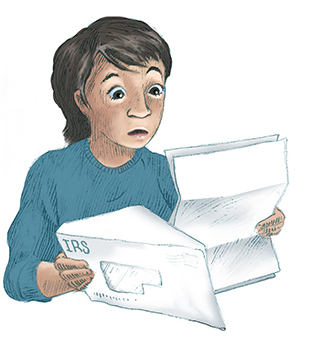Six different ways the IRS can audit you
August, 22 2019 by Carolyn Richardson, EA, MBA
It’s your worst nightmare – you come home from work, tired and looking forward to a relaxing dinner and binge-watching “Stranger Things” on Netflix, but in checking the mail, you find a letter from the Internal Revenue Service. You suddenly find yourself in the Upside-Down world of an income tax examination.
The IRS officially examines more than one million tax returns each year. To make matters worse, the IRS also conducts other types of tax reviews that are not classified as official audits – and these are far more common.
So how can the IRS ask to review your return? Let us count the ways.
 (1) Math Corrections: While the vast majority of taxpayers now use some sort of software or professionals to prepare their tax returns, math errors do still happen. Unlike 20 years ago, though, the “math error” corrections of today are different, and most involve the IRS correcting your return to match up with information they already have on file. For example, if you make estimated tax payments on a quarterly basis and you use your tax software to compute those for you, you need to be careful when preparing the following year to verify exactly how much you paid and when you paid it. It is not unusual for taxpayers to pay more or less than the previously calculated estimates, or to skip a payment entirely, but fail to make these corrections in their software. Another common error is to duplicate withholding, especially if you have stock transactions from your employer. This is an easy mistake to make as the withholding will be shown on the statement from your broker, but it may also be included in your W-2 withholding. If you’re not certain, you should check with your employer or the company that issued you the form showing the withholding.
(1) Math Corrections: While the vast majority of taxpayers now use some sort of software or professionals to prepare their tax returns, math errors do still happen. Unlike 20 years ago, though, the “math error” corrections of today are different, and most involve the IRS correcting your return to match up with information they already have on file. For example, if you make estimated tax payments on a quarterly basis and you use your tax software to compute those for you, you need to be careful when preparing the following year to verify exactly how much you paid and when you paid it. It is not unusual for taxpayers to pay more or less than the previously calculated estimates, or to skip a payment entirely, but fail to make these corrections in their software. Another common error is to duplicate withholding, especially if you have stock transactions from your employer. This is an easy mistake to make as the withholding will be shown on the statement from your broker, but it may also be included in your W-2 withholding. If you’re not certain, you should check with your employer or the company that issued you the form showing the withholding.
 (2) CP2000 Notices / Income Discrepancies: Starting around January of every year, the forms start coming. W-2s, 1099-Rs, 1099-MISC, and all the other various tax reporting forms issued from your employer, your pension or IRA, the Social Security Administration, and every other company which you may have an account with. Keeping track of all of this can be a large job, and if you don’t receive one that is issued or misplace one of these while preparing your return, you may get a CP2000 notice from the IRS later on. The CP2000 notice matches the items reported to the IRS with the income (and some deduction or credit items) reported by you on your return. If something is clearly missing, such as an IRA distribution, they will issue a notice to the taxpayer showing the income reported to the IRS, the income reported by the taxpayer, the difference between the two, and the proposed additional tax due.
(2) CP2000 Notices / Income Discrepancies: Starting around January of every year, the forms start coming. W-2s, 1099-Rs, 1099-MISC, and all the other various tax reporting forms issued from your employer, your pension or IRA, the Social Security Administration, and every other company which you may have an account with. Keeping track of all of this can be a large job, and if you don’t receive one that is issued or misplace one of these while preparing your return, you may get a CP2000 notice from the IRS later on. The CP2000 notice matches the items reported to the IRS with the income (and some deduction or credit items) reported by you on your return. If something is clearly missing, such as an IRA distribution, they will issue a notice to the taxpayer showing the income reported to the IRS, the income reported by the taxpayer, the difference between the two, and the proposed additional tax due.
In some cases, the income may actually be on the return, but the IRS cannot locate it because the taxpayer put it somewhere else. An example of this might be where the taxpayer has their own business on Schedule C, but one of their clients issues a 1099-MISC to report payments to them and shows the payment as “other income” rather than “nonemployee compensation.” The IRS computers will look for the amount on the “other income” line of the return, not on Schedule C.
An important thing to remember about the CP2000 is that while it has a “taxes due” on the first page of the notice, these are only proposed taxes, meaning they have not actually been assessed. If the taxpayer believes they reported everything to the IRS correctly, they have 30 days to respond with an explanation to dispute the proposed taxes. If the IRS does not receive a response within 45 days, the proposed taxes will be assessed.
 (3) Correspondence examination: While computers review all returns filed and catch many of the errors or income discrepancies, they also flag some returns for an actual audit. This is done by scoring the return using a formula. An employee at the IRS then reviews the return to determine if there is actual audit potential, and the vast majority of examinations – about 70% - are conducted via correspondence. If this happens to you, you will get a notice stating that your return is under examination, and either there will be boxes checked indicating the areas they are reviewing, or there will be a bulleted list. An “information document request” will also be included, indicating what areas are being examined and the specific documents that the IRS would like to see to support the items on your return. Generally, the IRS will give you 30 days to send back the documents, but you can request an additional 30 days by calling the number on the notice. Once the documents have been reviewed, the IRS will usually send you an examination report indicating what items they have adjusted and the tax due. If there was something missing or partially accepted, it will be indicated in an explanation of the adjustments, and you will have at least 15 days to provide additional information.
(3) Correspondence examination: While computers review all returns filed and catch many of the errors or income discrepancies, they also flag some returns for an actual audit. This is done by scoring the return using a formula. An employee at the IRS then reviews the return to determine if there is actual audit potential, and the vast majority of examinations – about 70% - are conducted via correspondence. If this happens to you, you will get a notice stating that your return is under examination, and either there will be boxes checked indicating the areas they are reviewing, or there will be a bulleted list. An “information document request” will also be included, indicating what areas are being examined and the specific documents that the IRS would like to see to support the items on your return. Generally, the IRS will give you 30 days to send back the documents, but you can request an additional 30 days by calling the number on the notice. Once the documents have been reviewed, the IRS will usually send you an examination report indicating what items they have adjusted and the tax due. If there was something missing or partially accepted, it will be indicated in an explanation of the adjustments, and you will have at least 15 days to provide additional information.
The good thing about these types of audits, if there can be a good thing about an audit, is that it doesn’t require you to show up in person. Also, these types of audits tend to be fairly simple, with only 2-3 items on the return being reviewed, and the audit confined to one specific tax year. The main disadvantage is that it may be several months before you hear back from the IRS regarding the results of their document review, and the audit is not assigned to a specific person so calling the IRS to follow up on the status of the audit can be extremely frustrating.
 (4) Office examination: This is likely what most taxpayers think of as the classic audit situation. You receive a letter asking you to schedule an appointment to appear at the nearby IRS office, documents in hand. This type of examination is far more intimidating and time-consuming, as the IRS sends only more complicated or expansive examinations to the face-to-face audit groups. You will likely need to take time off from work to attend the appointment, and it may require you to take off time from work more than once if additional follow up appointments are required. The only real advantage to this type of examination is that it gives you the opportunity to talk to a specific IRS auditor that has been assigned to your case, and you have the opportunity to explain your return and documents in person. This can also be a disadvantage however, if the auditor doesn’t accept your explanations or your documents do not actually support what you did on the return. Also, keep in mind that the examination is scheduled typically for two hours, so if your documents are not organized before you arrive the examiner will not review them or organize them for you but will send you away with a new appointment time, or even a proposed audit result.
(4) Office examination: This is likely what most taxpayers think of as the classic audit situation. You receive a letter asking you to schedule an appointment to appear at the nearby IRS office, documents in hand. This type of examination is far more intimidating and time-consuming, as the IRS sends only more complicated or expansive examinations to the face-to-face audit groups. You will likely need to take time off from work to attend the appointment, and it may require you to take off time from work more than once if additional follow up appointments are required. The only real advantage to this type of examination is that it gives you the opportunity to talk to a specific IRS auditor that has been assigned to your case, and you have the opportunity to explain your return and documents in person. This can also be a disadvantage however, if the auditor doesn’t accept your explanations or your documents do not actually support what you did on the return. Also, keep in mind that the examination is scheduled typically for two hours, so if your documents are not organized before you arrive the examiner will not review them or organize them for you but will send you away with a new appointment time, or even a proposed audit result.
 (5) Field examination: This is the job of the Revenue Agents and is usually reserved for the complicated or high-income individual returns and business entities. In this case, the IRS will send you a letter stating your return is under examination and to call for an appointment. Revenue Agents typically conduct their audits at your home or place of business, rather than you coming to them at the IRS office. While this may mean that you don’t have to take time away from your employment or business, this can also feel more intrusive than the previously mentioned audits. Also, Revenue Agents are more highly trained and usually have more experience than other IRS examiners, so they handle the most complicated examinations and are more likely to expand the examination from the original scope or to pick up additional tax years for examination if there is an issue with the original year.
(5) Field examination: This is the job of the Revenue Agents and is usually reserved for the complicated or high-income individual returns and business entities. In this case, the IRS will send you a letter stating your return is under examination and to call for an appointment. Revenue Agents typically conduct their audits at your home or place of business, rather than you coming to them at the IRS office. While this may mean that you don’t have to take time away from your employment or business, this can also feel more intrusive than the previously mentioned audits. Also, Revenue Agents are more highly trained and usually have more experience than other IRS examiners, so they handle the most complicated examinations and are more likely to expand the examination from the original scope or to pick up additional tax years for examination if there is an issue with the original year.
 (6) Audit Reconsideration: You can be audited even if you never filed a tax return. If you don’t file a tax return the IRS can create a tax return for you based on income information they’ve received. This is generally known as a “Substitute for Return” (SFR), and if you don’t agree with it you can request an audit reconsideration. More commonly, though, an audit reconsideration is requested through the Collections division after the original audit has been concluded and the taxes assessed. Sometimes, however, the taxpayer never received the original audit notice (one of those explained previously), and this may be their first exposure to the audit itself. While there are certain conditions that apply, the primary qualification is you are able to present documents that support your return that were not available at the time the audit was completed. Audit reconsiderations are normally only granted when the taxpayer has information that was not previously considered by the IRS. This may be the case if you had trouble locating the documents you needed, such as they were at your mother’s house on the other side of the country and she could not mail them to you during the audit. It may also occur when you need to obtain copies of documents from a third-party such as an employer or stockbroker, and they delayed so much in getting them to you that the IRS closed the original examination without them. Keep in mind, however, that you do not qualify for an audit reconsideration simply because you do not agree with the results of the original audit. There are other avenues of appeal if that is the case.
(6) Audit Reconsideration: You can be audited even if you never filed a tax return. If you don’t file a tax return the IRS can create a tax return for you based on income information they’ve received. This is generally known as a “Substitute for Return” (SFR), and if you don’t agree with it you can request an audit reconsideration. More commonly, though, an audit reconsideration is requested through the Collections division after the original audit has been concluded and the taxes assessed. Sometimes, however, the taxpayer never received the original audit notice (one of those explained previously), and this may be their first exposure to the audit itself. While there are certain conditions that apply, the primary qualification is you are able to present documents that support your return that were not available at the time the audit was completed. Audit reconsiderations are normally only granted when the taxpayer has information that was not previously considered by the IRS. This may be the case if you had trouble locating the documents you needed, such as they were at your mother’s house on the other side of the country and she could not mail them to you during the audit. It may also occur when you need to obtain copies of documents from a third-party such as an employer or stockbroker, and they delayed so much in getting them to you that the IRS closed the original examination without them. Keep in mind, however, that you do not qualify for an audit reconsideration simply because you do not agree with the results of the original audit. There are other avenues of appeal if that is the case.
Surviving an audit
 Regardless of which method the IRS decides to use to audit your return, there are a few things you can do to make things go better for yourself. First, don’t delay – these notices are time sensitive and hoping it will go away is not an audit strategy. Second, review the notice carefully to determine what the IRS is questioning, and what documents or other support they would like to see from you. Retrieve those documents from your files as soon as possible and organize them, so they are grouped by item in the same order as requested on the notice. That way, if there is something missing, you will have time to secure another copy. Do not submit anything that the IRS has not requested. Also, always send copies, do not send original documents, as they are not likely to be returned.
Regardless of which method the IRS decides to use to audit your return, there are a few things you can do to make things go better for yourself. First, don’t delay – these notices are time sensitive and hoping it will go away is not an audit strategy. Second, review the notice carefully to determine what the IRS is questioning, and what documents or other support they would like to see from you. Retrieve those documents from your files as soon as possible and organize them, so they are grouped by item in the same order as requested on the notice. That way, if there is something missing, you will have time to secure another copy. Do not submit anything that the IRS has not requested. Also, always send copies, do not send original documents, as they are not likely to be returned.
If your world has become Upside-Down by the IRS, rather than trying to rescue yourself, you can always turn to your plucky band of friends here at TaxAudit if you have Audit Defense. If you didn’t purchase it at the time you prepared your tax return; you can purchase it now here. Our experts are familiar with all of the IRS audits mentioned above and have handled thousands of them. We know how to respond to them efficiently and quickly, and we will do the follow-up work for you regardless of how long it takes.





